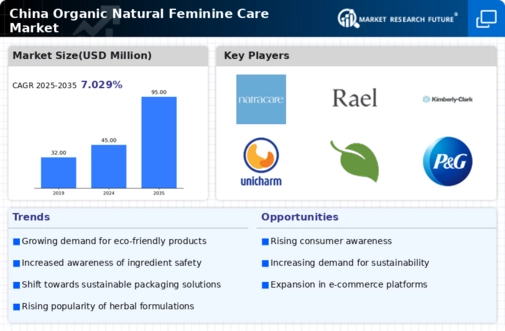The organic natural-feminine-care market in China is characterized by a dynamic competitive landscape, driven by increasing consumer awareness regarding health and environmental sustainability. Major players such as Procter & Gamble (US), Unilever (GB), and Kimberly-Clark (US) are actively reshaping their strategies to align with these consumer preferences. Procter & Gamble (US) has focused on innovation, particularly in developing biodegradable products, while Unilever (GB) emphasizes sustainability through its commitment to reducing plastic waste. Kimberly-Clark (US) is enhancing its operational focus on digital transformation, aiming to streamline its supply chain and improve customer engagement. Collectively, these strategies contribute to a competitive environment that prioritizes sustainability and innovation, reflecting a broader shift in consumer expectations.
Key business tactics within this market include localizing manufacturing and optimizing supply chains to enhance efficiency and responsiveness to consumer demands. The competitive structure appears moderately fragmented, with a mix of established multinational corporations and emerging local brands. This fragmentation allows for diverse product offerings, catering to various consumer segments, while the influence of key players remains substantial in shaping market trends and standards.
In September 2025, Unilever (GB) announced a partnership with a local Chinese startup to develop a new line of organic feminine hygiene products. This collaboration is strategically significant as it not only enhances Unilever's product portfolio but also allows for better penetration into the local market, leveraging the startup's understanding of regional consumer preferences. Such partnerships may serve to strengthen Unilever's competitive position by fostering innovation and responsiveness to local needs.
In October 2025, Cora (US) launched a new subscription service tailored specifically for the Chinese market, offering personalized product selections based on individual consumer preferences. This move indicates a strategic pivot towards enhancing customer experience through customization, which could potentially increase brand loyalty and market share. By focusing on personalized services, Cora (US) appears to be positioning itself as a leader in consumer-centric innovation within the organic natural-feminine-care sector.
In November 2025, Kimberly-Clark (US) unveiled a new initiative aimed at integrating AI technology into its product development processes. This initiative is likely to enhance efficiency and innovation, allowing for quicker responses to market trends and consumer feedback. The integration of AI could also streamline supply chain operations, further solidifying Kimberly-Clark's competitive edge in a rapidly evolving market.
As of November 2025, current trends in the organic natural-feminine-care market are increasingly defined by digitalization, sustainability, and the integration of advanced technologies such as AI. Strategic alliances are becoming more prevalent, enabling companies to leverage each other's strengths and enhance their market positions. Looking ahead, competitive differentiation is expected to evolve, with a notable shift from price-based competition towards innovation, technology, and supply chain reliability. This evolution suggests that companies will need to prioritize not only product quality but also the overall consumer experience to maintain a competitive advantage.


















Leave a Comment